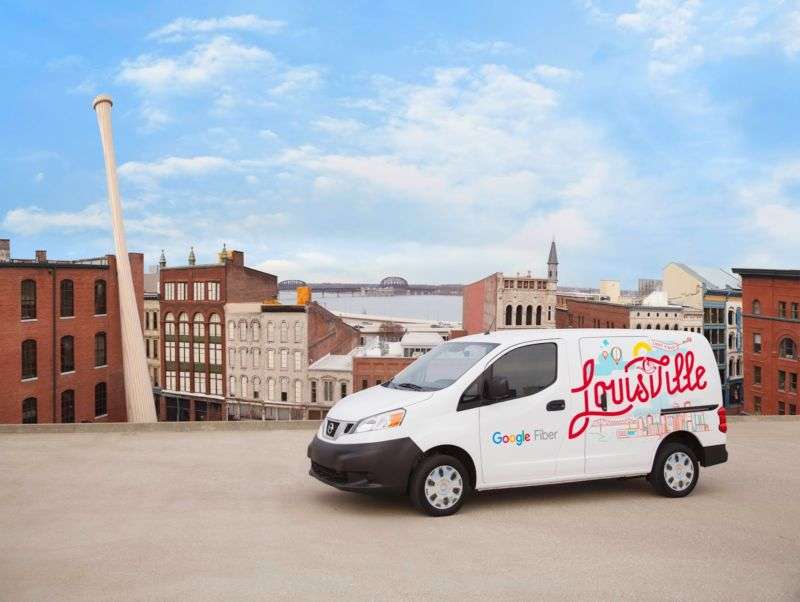
Google Fiber exits Louisville after shoddy installs left exposed wires in roads

Google Fiber will turn off its network in Louisville, Kentucky and exit the city after a series of fiber installation failures left cables exposed in the roads. Google Fiber’s customers in Louisville will have to switch ISPs and will get their final two months of Google Fiber service for free to help make up for the disruption.
Google Fiber went live in Louisville late in 2017, just a few months after construction began. The quick turnaround happened because Google Fiber used a “micro-trenching” strategy that is quicker than traditional underground fiber deployment and doesn’t require digging giant holes. Instead of a foot-wide trench, a micro-trench is about an inch wide and four inches deep.
But Louisville residents soon found exposed cables, as a WDRB article noted in March 2018. “When you’re walking around the neighborhood, [the lines are] popping up out of the road all over the place,” resident Larry Coomes said at the time. “People are tripping over it.”
In August 2018, Google Fiber announced a plan to fix the problem, WDRB reported at the time. But Google Fiber never quite got it right, and yesterday the Alphabet-owned ISP announced that it will leave the city in a blog post titled “Saying Goodbye to Louisville.”
“As we told our customers today, we will be turning off the network on April 15 and their next two months of service are on us,” Google Fiber wrote, pledging to “work with our customers and partners to minimize disruption.”
Going back to AT&T
Google Fiber customer Dan Pike called the decision “a bummer” because the ISP offered good service at a reasonable price, according to a WFPL article yesterday. “He’ll probably return to AT&T for Internet service, and said he expects to pay more for lower speeds,” the article said.
Google Fiber said its micro-trenching problems in Louisville are so severe that it would have to “essentially rebuild our entire network” to fix them.
“In Louisville, we’ve encountered challenges that have been disruptive to residents and caused service issues for our customers,” Google Fiber wrote. “We’re not living up to the high standards we set for ourselves, or the standards we’ve demonstrated in other Fiber cities. We would need to essentially rebuild our entire network in Louisville to provide the great service that Google Fiber is known for, and that’s just not the right business decision for us.”
There are reportedly still exposed wires in the roads. Google Fiber told WFPL that it will “be working closely with our metro partners to make sure that any assets left behind are safe and stable for the long term.” The city could use any remaining fiber itself after Google Fiber leaves.
No plans to leave other cities, ISP says
Google Fiber is using micro-trenching in other cities, such as Austin, Texas. But the ISP said its decision to leave Louisville “has no impact on our operations in any of our other Fiber cities, where we continue to sign up and install new customers every day.”
“The lessons we’ve learned in Louisville have already made us better in our other Google Fiber cities,” the company wrote. “We’ve refined our micro-trenching methods and are seeing good outcomes elsewhere.”
Google Fiber’s Louisville deployment came amid a legal battle involving AT&T, Charter, and the local government in Louisville and Jefferson County. AT&T and Charter sued the county government to stop a One Touch Make Ready ordinance that let new entrants like Google Fiber make all of the necessary wire adjustments on utility poles instead of having to wait for incumbent providers to send work crews to move their own wires.
AT&T’s lawsuit was thrown out of court, while Charter’s is still pending. Although the utility pole ordinance has remained in force, Google Fiber ended up installing fiber lines using the quicker micro-trenching technique.
Google Fiber’s departure is good news for AT&T and Charter’s Spectrum service. “Google customers had been paying $50 per month for 100Mbps service and $70 per month for 1Gbps service, prices that competitors AT&T and Spectrum were feeling pressure to match,” the Courier-Journal wrote.
Besides Louisville, Google Fiber offers fiber Internet service in 11 metro areas, and “Webpass” wireless Internet service for apartments and condos in seven metro areas. Google Fiber previously turned wireless service off in Boston. Staff cutbacks and decisions to pull out of cities before construction began have also limited the ISP’s reach.
Disclosure: The Advance/Newhouse Partnership, which owns 13 percent of Charter, is part of Advance Publications. Advance Publications owns Condé Nast, which owns Ars Technica.




